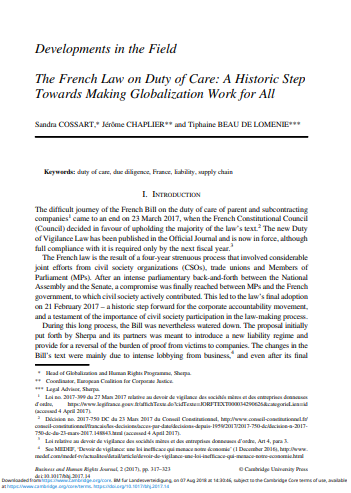By Sandra COSSART, Jérôme and Tiphaine BEAU DE LOMENIE
INTRODUCTION
The difficult journey of the French Bill on the duty of care of parent and subcontracting companies came to an end on 23 March 2017, when the French Constitutional Council (Council) decided in favour of upholding the majority of the law’s text. The new Duty of Vigilance Law has been published in the Official Journal and is now in force, although full compliance with it is required only by the next fiscal year.
The French law is the result of a four-year strenuous process that involved considerable joint efforts from civil society organizations (CSOs), trade unions and Members of Parliament (MPs). After an intense parliamentary back-and-forth between the National Assembly and the Senate, a compromise was finally reached between MPs and the French government, to which civil society actively contributed. This led to the law’s final adoption on 21 February 2017 – a historic step forward for the corporate accountability movement, and a testament of the importance of civil society participation in the law-making process.
During this long process, the Bill was nevertheless watered down. The proposal initially put forth by Sherpa and its partners was meant to introduce a new liability regime and provide for a reversal of the burden of proof from victims to companies. The changes in the Bill’s text were mainly due to intense lobbying from business, and even after its final adoption, the proponents of the text still feared major setbacks. Indeed, 120 right-wing legislators from both chambers of the French Parliament referred the Bill to the Council, France’s highest court, on grounds of unconstitutionality. Recent decisions made by the Council had suggested that it was likely to censor the text, and impose a very liberal conception of company law and freedom to trade and do business to the legislator. Nevertheless, in a landmark ruling, the Council held the majority of the law’s text to be in line with constitutional principles. The only exception was the civil fine sanctioning non-compliance with the duty of care. The Council’s ruling was welcomed as a very encouraging decision by French and European CSOs.
This piece looks at how this French law fits into the growing trend to embed corporate respect for human rights into different types of legal requirements. After describing its main characteristics, the piece reflects on the Council ruling and a potential political shift that this decision reveals.

